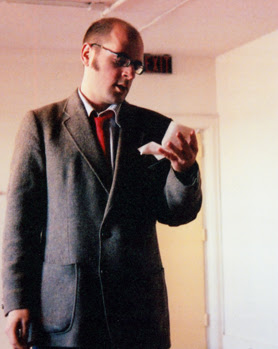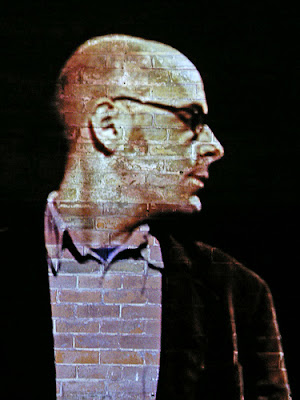1) What the fuck is going on?
That’s what we trying to figure out in rehearsal.
2) You’ve written a lot about theatre, do you have any unifying theories that have risen to the top?
Right now, “curiosity” is a key word. As long as curiosity is there I think we have a chance. Also curiously doesn’t demand a specific style, which is good, since everyone making the same work would be very boring. Also a dedication to the “same time, same place” features of live performance – that we share time and space with our audience. This, in these times of mediation, seems remarkable and perhaps a trait we should focus on and articulate.
3) Are you particularly interested in the concept of contradiction?
Not so much anymore. I may at one point have almost fetishized it – but now I find myself wanting to move past it. The understanding that not everything lines up and some things bump against each other is important but not enough.
4) What’s the difference between independent theatre communities in Halifax and Toronto?
Very little and so much. Largely a question of scale – and infrastructure support. There is an Arts Council in Toronto, and an arm’s length provincial council, which isn’t true in Halifax (thanks to the Conservatives). And because of the size of city, I can feel like I’m not part of the “Toronto theatre scene” and yet have a very strong sense of solidarity with a group of collaborators and an audience that continues to expand. It feels hard to speak to the communities, since I’m not in Halifax anymore.
 5) What do you mean by “all statements are insecure questions”?
5) What do you mean by “all statements are insecure questions”?
It may actually be a quote, but I don’t remember from where. Most directly: If I say “Theatre can change the world.” perhaps I am saying “What if theatre can change the world?” or “How can theatre change the world?” We (I) make bold or far reaching statements sometimes and I feel it’s important to remember that those statements are actually proposals, questions. Imagine that every statement in these answers are questions. And then think about them and work towards your own answers to those new questions.
Ideally I might be strong enough to ask bold questions only, but I can get paralyzed in a cycle of questions and so needed a way to be able to plant a flag and take a position, even if only temporarily.
6) Do you have a specific or consistent approach to dramaturgy?
No. Every project is different and requires different systems and strategies. On the whole I believe in structure – but in diverse structures, not only traditional narrative structures, but also [asking] what is the structure of a good walk, of a nice dinner with friends, of a John Cage piece, a Situationist city plan, of a radio show or a Gerhard Richter painting? There are so many possible ways to take people through an evening that I think it’s a matter of finding the way for any given piece, not fitting material into something that looks like other plays. Also, I try to think of the dramaturgy extending past the performance itself to include everything around the show – posters, the first thing people see when they come in the doors of the lobby, the music etc . . . all of that is part of the experience and therefore part of the dramaturgy.
7) Any thoughts on how the printing press has influenced the theatre arts?
Well, it changed everything and so those changes to everything have changed theatre. But specifically, one thing is that it brought us to a point where copyright was invented, which led to a brisk trade in playscripts and probably shaped the way we think of theatre as a version of a printed thing rather then a live event that sometimes leaves a printed trail.
 8) Why are the cynics wrong?
8) Why are the cynics wrong?
I’m not sure they are wrong – but I don’t think they’re helping. And I can’t imagine that they (whoever they are) are very happy. Cynicism is much like getting caught in the contradiction. Curiosity can help keep cynicism in its place (and I think it very much has done). Also optimism in the face of cynicism is important. And they are wrong because there is always capacity for change. And sometimes change works out.
9) What would you do with a $1,000,000 no-strings production grant?
Pay people well for a long time. I have been supported by so many people working so hard and investing so much of their creativity and lives in my work for so little financial reward that my first impulse is to pay them.
In terms of a project, not sure. After Dedicated to the Revolutions is done, I’m not sure what’s next. Maybe making a new musical in the Brecht/Weil tradition, mixed with my concerns. So that would take a while and could use some money.
10) What kind of questions do you most like to be asked about your work?
I wish we talked more about the “why” questions. Not in the rehearsal hall, but between artists (and in public). Why certain choices get made, why one makes theatre, why this staging over another, why work in a certain way . . . They’re hard questions and we avoid them because, I think, they would lead to disagreement and out of some fear that articulating them could be dangerous to inspiration (over-analyzing). But I think they’re very important as we continue forward and wish we could find a way to talk about it. To talk about the ethics/values of our work.
I like Zimmer’s definition of contradiction: “The understanding that not everything lines up and some things bump against each other . . .”
Chuck from Steel, said something similar to Edmund when he tells him he doesn’t know where how fit in:
“People don’t fit. There’s always spaces in between, things that overlap. People can only figure themselves out by being honest.”